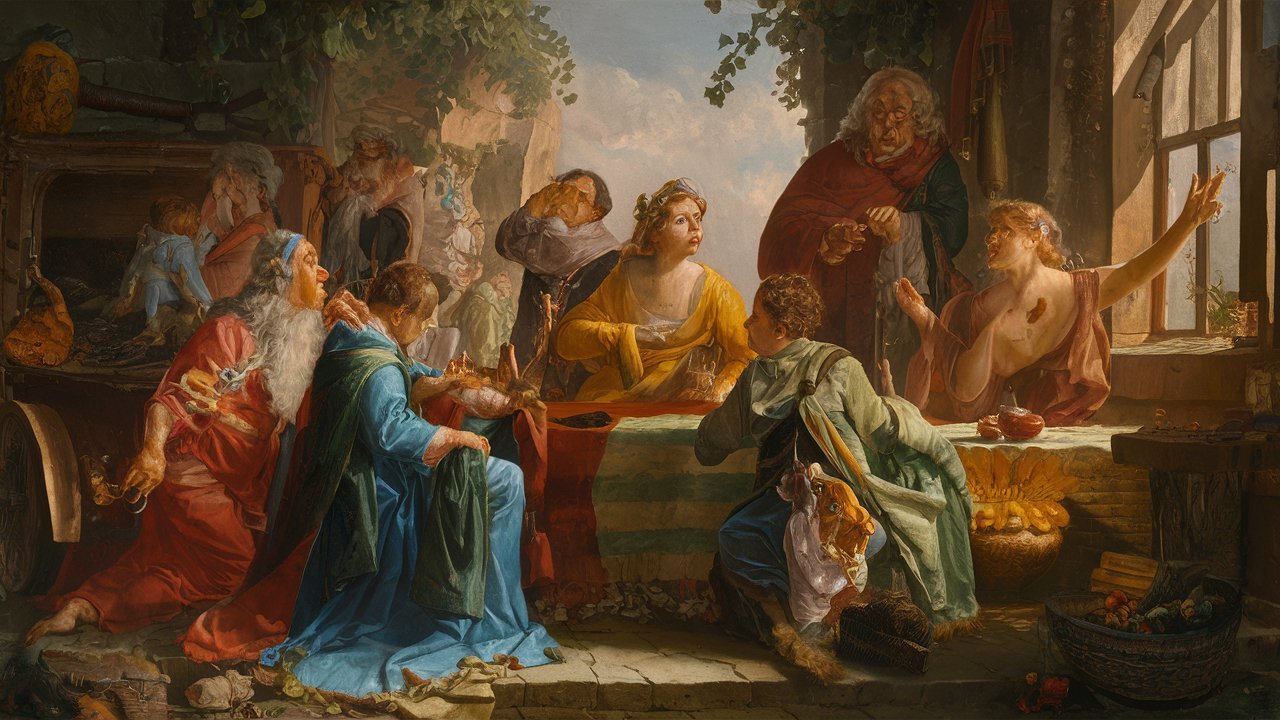
Dante Alighieri's "Divine Comedy" stands as a monumental masterpiece in the world of literature, captivating readers and scholars alike for centuries. This epic poem, written in the early 14th century, takes us on an extraordinary journey through the realms of Hell, Purgatory, and Paradise, offering a vivid exploration of medieval Christian theology and philosophy. With its rich tapestry of allegory, symbolism, and moral inquiry, "Divine Comedy" not only provides a window into the medieval mindset but also continues to inspire discussions on the nature of good and evil, redemption, and the quest for divine love. Here, we'll delve into 50 fascinating facts about this timeless work, shedding light on its historical context, literary significance, and enduring legacy. Whether you're a long-time admirer or new to Dante's work, these insights promise to enrich your appreciation of one of literature's greatest achievements.
The Origins of Divine Comedy
Dante Alighieri's "Divine Comedy" is a cornerstone of world literature. Written in the early 14th century, this epic poem takes readers on a journey through Hell, Purgatory, and Heaven.
- Dante began writing "Divine Comedy" in 1308 and completed it in 1320, a year before his death.
- The poem is divided into three parts: Inferno, Purgatorio, and Paradiso.
- Each part contains 33 cantos, except for Inferno, which has an additional introductory canto, making a total of 100 cantos.
- Dante wrote the poem in the Tuscan dialect, which helped standardize the Italian language.
The Structure and Style
The structure and style of "Divine Comedy" are meticulously crafted, reflecting Dante's deep understanding of theology, philosophy, and literature.
- The poem is written in terza rima, a rhyme scheme of aba, bcb, cdc, and so on.
- Each canto consists of approximately 142 lines.
- Dante uses allegory extensively, with characters and events symbolizing deeper moral and spiritual meanings.
- The number three is significant throughout the poem, representing the Holy Trinity.
The Journey Through Inferno
Inferno, the first part of "Divine Comedy," describes Dante's journey through Hell, guided by the Roman poet Virgil.
- Hell is depicted as nine concentric circles, each representing a different sin.
- The first circle, Limbo, is for virtuous non-Christians and unbaptized infants.
- The ninth circle, Treachery, is reserved for traitors, with Satan himself trapped in ice at its center.
- Dante encounters historical and mythological figures, such as Homer, Julius Caesar, and Ulysses.
The Ascent of Purgatorio
In Purgatorio, Dante and Virgil ascend the mountain of Purgatory, where souls purify themselves before entering Heaven.
- Purgatory is divided into seven terraces, each corresponding to one of the seven deadly sins.
- At the top of the mountain lies the Earthly Paradise, also known as the Garden of Eden.
- Souls in Purgatory can eventually reach Heaven, unlike those in Hell.
- Dante meets his beloved Beatrice at the summit, who becomes his guide for the rest of the journey.
The Bliss of Paradiso
Paradiso, the final part of the poem, describes Dante's journey through the nine celestial spheres of Heaven.
- Each sphere is associated with a particular virtue and celestial body.
- The first sphere, the Moon, is for souls who failed to keep their vows.
- The ninth sphere, the Primum Mobile, is the realm of angels.
- Dante's ultimate destination is the Empyrean, where he experiences the Beatific Vision of God.
The Characters and Symbolism
"Divine Comedy" is rich with characters and symbolism, each adding depth to Dante's narrative.
- Virgil symbolizes human reason and wisdom.
- Beatrice represents divine love and grace.
- The three beasts Dante encounters in the dark forest symbolize different sins: the leopard (fraud), the lion (violence), and the she-wolf (incontinence).
- The river Lethe in Purgatory erases the memory of sins, while the river Eunoe restores the memory of good deeds.
The Historical and Cultural Impact
"Divine Comedy" has had a profound impact on literature, art, and culture throughout history.
- The poem influenced countless writers, including Geoffrey Chaucer, John Milton, and T.S. Eliot.
- Artists like Sandro Botticelli and Gustave Doré created famous illustrations of the poem.
- Dante's depiction of Hell inspired many later works, including John Bunyan's "The Pilgrim's Progress."
- The poem's themes of justice, redemption, and divine love continue to resonate with readers today.
The Legacy of Dante Alighieri
Dante's legacy extends beyond "Divine Comedy," as he is considered one of the greatest poets in history.
- Dante was exiled from Florence in 1302 due to political conflicts, which influenced his writing.
- He wrote other significant works, including "La Vita Nuova" and "De Monarchia."
- Dante's tomb is located in Ravenna, Italy, where he spent his final years.
- The annual Dante Alighieri Society promotes Italian culture and language worldwide.
Fun Facts About Divine Comedy
Here are some intriguing tidbits about "Divine Comedy" that might surprise you.
- Dante's full name was Durante di Alighiero degli Alighieri.
- The poem was originally titled "Commedia," with "Divine" added later by Giovanni Boccaccio.
- Dante's depiction of Hell includes a frozen lake, which contrasts with the fiery imagery commonly associated with it.
- The phrase "Abandon all hope, ye who enter here" is one of the most famous lines from the poem.
Modern Interpretations and Adaptations
"Divine Comedy" continues to inspire modern interpretations and adaptations in various media.
- Numerous films, including "Se7en" and "What Dreams May Come," draw inspiration from Dante's work.
- Video games like "Dante's Inferno" bring the poem's vivid imagery to life.
- The poem has been adapted into operas, plays, and even graphic novels.
- Scholars and enthusiasts still debate the meanings and interpretations of various passages.
The Influence on Language and Literature
Dante's "Divine Comedy" has left an indelible mark on language and literature.
- The poem helped establish the Tuscan dialect as the standard Italian language.
- Dante's use of vernacular language made literature more accessible to the general public.
- Many phrases from the poem, such as "the darkest places in hell," have entered common usage.
- "Divine Comedy" is considered one of the greatest works of world literature, alongside Homer's "Iliad" and Shakespeare's plays.
The Philosophical and Theological Themes
"Divine Comedy" explores profound philosophical and theological themes that continue to captivate readers.
- The poem addresses the nature of sin, redemption, and divine justice.
- Dante's journey symbolizes the soul's path toward God and ultimate salvation.
- The poem reflects medieval Christian beliefs, but its themes are universal and timeless.
- Dante's vision of the afterlife has influenced religious thought and imagery for centuries.
The Enduring Popularity
Despite being over 700 years old, "Divine Comedy" remains popular and relevant today.
- The poem is studied in schools and universities around the world.
- New translations and editions continue to be published, ensuring that Dante's masterpiece reaches new generations of readers.
A Final Stroll Through Dante's Masterpiece
Dante's Divine Comedy stands as a monumental pillar in the literary world, offering readers a journey through the realms of the afterlife. With its intricate blend of moral philosophy, theological insight, and vivid imagery, this epic poem has captivated audiences for centuries. From the dark woods of error to the celestial paradise, Dante's work is more than just a story; it's a profound exploration of human nature, ethics, and the quest for divine justice. As we've journeyed through the Inferno, climbed the mountain of Purgatorio, and basked in the light of Paradiso, we've uncovered a treasure trove of wisdom and beauty. Dante's Divine Comedy remains a timeless guide, inviting each reader to reflect on their own path and the choices that shape our destinies. Truly, this masterpiece is a testament to the enduring power of human creativity and the quest for understanding in a complex world.
Was this page helpful?
Our commitment to delivering trustworthy and engaging content is at the heart of what we do. Each fact on our site is contributed by real users like you, bringing a wealth of diverse insights and information. To ensure the highest standards of accuracy and reliability, our dedicated editors meticulously review each submission. This process guarantees that the facts we share are not only fascinating but also credible. Trust in our commitment to quality and authenticity as you explore and learn with us.


